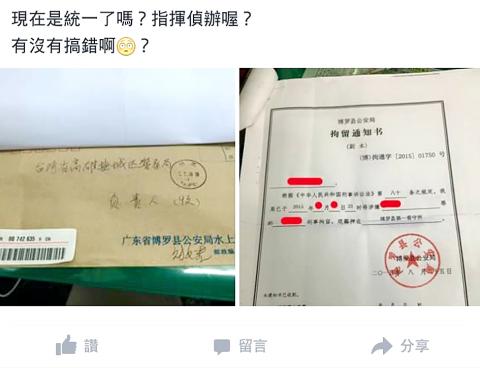Kaohsiung police were incensed by a recent “official document” sent by police in China’s Guandong Province ordering Taiwanese police to follow up on a criminal case.
Officers at Kaohsiung’s Yancheng District (鹽埕) Police Station were perplexed after receiving the document by mail earlier this week, which originated from the Chinese Ministry of Public Security’s Boluo County Shuishang District Police Precinct.
After opening the letter, the Kaohsiung police said, they were offended by the audacity of a Chinese police precinct ordering them to contact the family of a Taiwanese man surnamed Huang (黃), who was under arrest at a detention center in Boluo County and was a suspect in a criminal investigation.

Photo: Copied by Huang Chien-hua, Taipei Times
Accompanying the letter was a “Notice of Detention for Investigation,” which presented information on Huang’s arrest and the background of his case.
An officer at the police station was quoted as saying: “What is going on here? Is Taiwan part of China now? They are ordering us to follow up on an investigation.”
Kaohsiung City Police Chief Chen Chia-chin (陳家欽) said he has instructed police units in the city not to comply with any request made by units of the Chinese Ministry of Public Security, as they had violated terms of the Cross-Strait Joint Crime-Fighting and Judicial Mutual Assistance Agreement (海峽兩岸共同打擊犯罪及司法互助協議), which was signed by Taiwan and China in 2009.
The Ministry of Public Security is China’s principal police authority and is responsible for law enforcement.
Yancheng District Police Chief Yen Ming-chung (顏明忠) rejected reports that his officers followed up on the order from their Chinese counterparts to contact Huang’s family.
“The ‘official document’ sent from China was in obvious violation of the 2009 mutual legal assistance agreement. We did not comply with the letter’s request,” Yen said on Friday.
The proper channel for agents of the Chinese ministry to submit requests to Taiwanese law enforcement is through the Cross-Strait Affairs Section of the Criminal Investigation Bureau at the National Police Administration, which would then pass on documents or notifications to the appropriate units at the county or city level, Chen said.

MAKING WAVES: China’s maritime militia could become a nontraditional threat in war, clogging up shipping lanes to prevent US or Japanese intervention, a report said About 1,900 Chinese ships flying flags of convenience and fishing vessels that participated in China’s military exercises around Taiwan last month and in January last year have been listed for monitoring, Coast Guard Administration (CGA) Deputy Director-General Hsieh Ching-chin (謝慶欽) said yesterday. Following amendments to the Commercial Port Act (商港法) and the Law of Ships (船舶法) last month, the CGA can designate possible berthing areas or deny ports of call for vessels suspected of loitering around areas where undersea cables can be accessed, Oceans Affairs Council Minister Kuan Bi-ling (管碧玲) said. The list of suspected ships, originally 300, had risen to about

DAREDEVIL: Honnold said it had always been a dream of his to climb Taipei 101, while a Netflix producer said the skyscraper was ‘a real icon of this country’ US climber Alex Honnold yesterday took on Taiwan’s tallest building, becoming the first person to scale Taipei 101 without a rope, harness or safety net. Hundreds of spectators gathered at the base of the 101-story skyscraper to watch Honnold, 40, embark on his daredevil feat, which was also broadcast live on Netflix. Dressed in a red T-shirt and yellow custom-made climbing shoes, Honnold swiftly moved up the southeast face of the glass and steel building. At one point, he stepped onto a platform midway up to wave down at fans and onlookers who were taking photos. People watching from inside

Japan’s strategic alliance with the US would collapse if Tokyo were to turn away from a conflict in Taiwan, Japanese Prime Minister Sanae Takaichi said yesterday, but distanced herself from previous comments that suggested a possible military response in such an event. Takaichi expressed her latest views on a nationally broadcast TV program late on Monday, where an opposition party leader criticized her for igniting tensions with China with the earlier remarks. Ties between Japan and China have sunk to the worst level in years after Takaichi said in November that a hypothetical Chinese attack on Taiwan could bring about a Japanese

STREAMLINED: The dedicated funding would allow the US to transfer equipment to Taiwan when needed and order upgraded replacements for stockpiles, a source said The US House of Representatives on Thursday passed a defense appropriations bill totaling US$838.7 billion, of which US$1 billion is to be allocated to reinforcing security cooperation with Taiwan and US$150 million to replace defense articles provided to the nation. These are part of the Consolidated Appropriation Act, which the US House yesterday passed with 341 votes in favor and 88 against. The act must be passed by the US Senate before Friday next week to avoid another government shutdown. The US House Committee on Appropriations on Monday unveiled the act, saying that it allocates US$1 billion for the Taiwan Security Cooperation Initiative